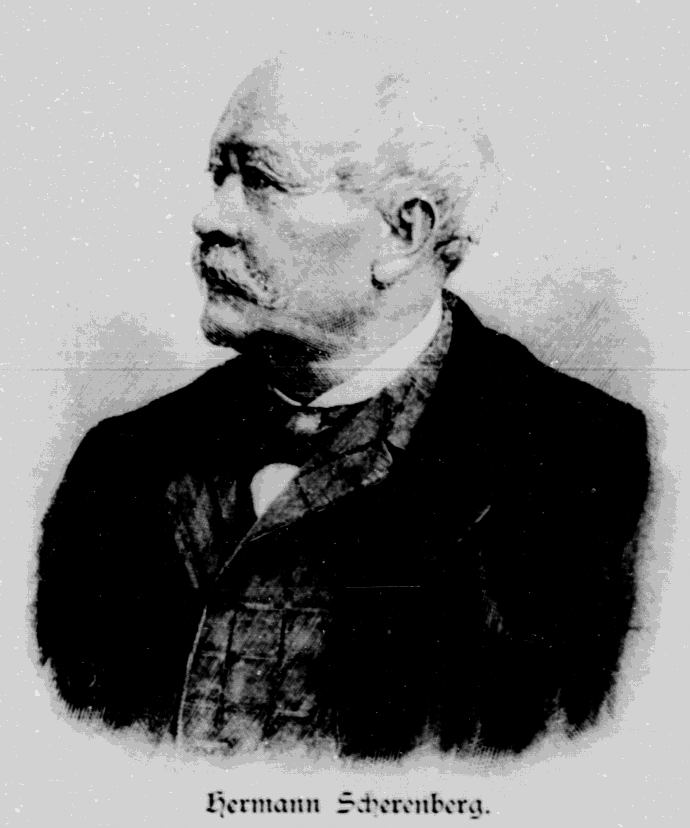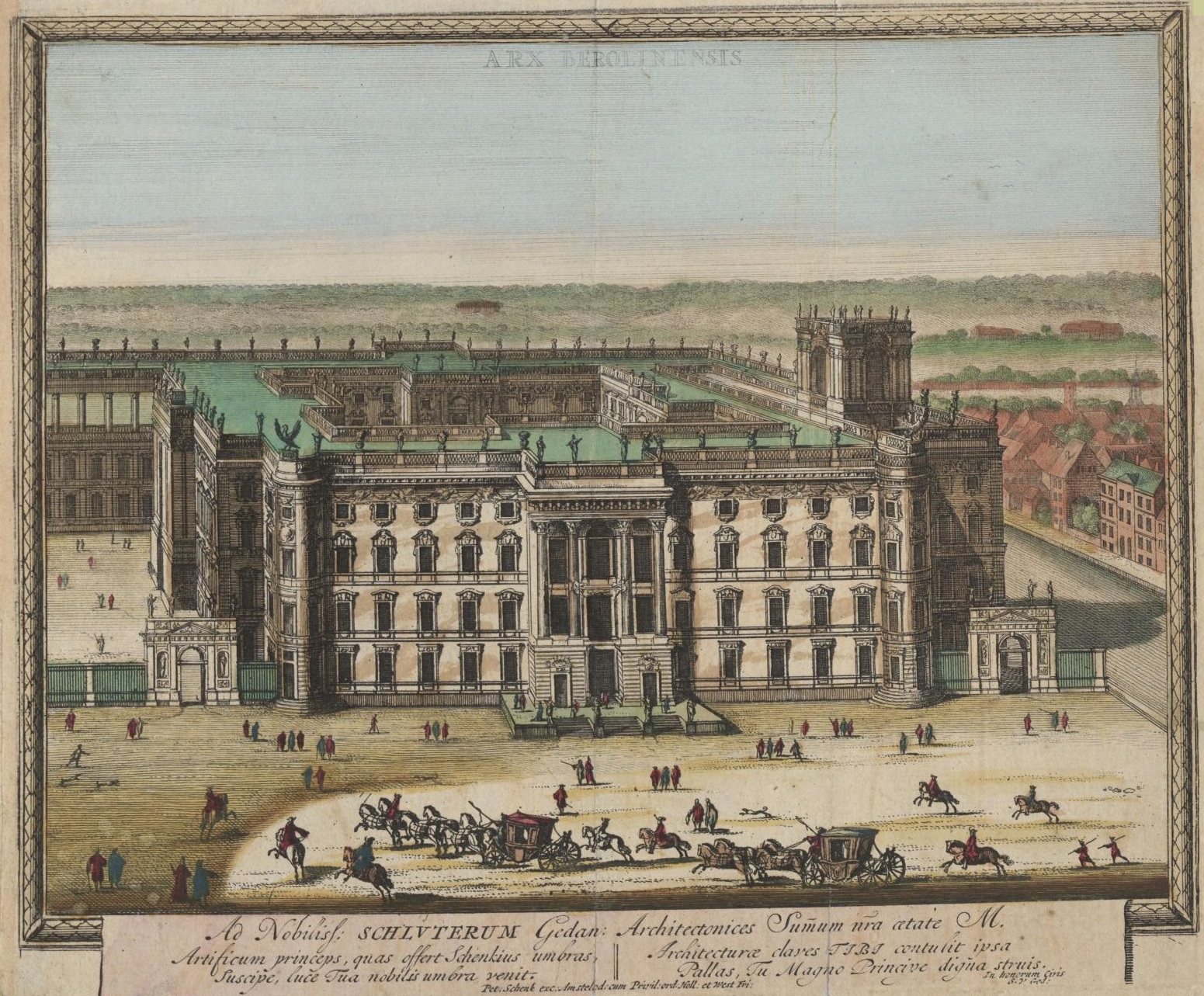|
Hermann Scherenberg
Hermann Scherenberg (20 January 1826, Swinemünde - 21 August 1897, Berlin) was a German painter, illustrator and caricaturist. Biography According to Theodor Fontane, who knew the Scherenbergs and wrote about them in his autobiography, the family originally came from Westphalia and his father, Johann Friedrich Scherenberg, lived in the Huguenot colony in Swinemünde. Hermann was born to Johann's second wife. His older half-brother was the poet, . He was also related to the poet and journalist, . From 1846 to 1847, he studied painting at the Kunstakademie Düsseldorf, under the tutelage of Theodor Hildebrandt. For many years, he was an employee of the ''Illustrirte Zeitung'', providing hundreds of illustrations. He drew portraits of prominent personalities and major events from Prussian and German history as well as scenes from everyday life. He had one son, Hans, who apparently also became a painter, although no further information is available. He was interred at the in Be ... [...More Info...] [...Related Items...] OR: [Wikipedia] [Google] [Baidu] |
Invasion Of Rügen (1678)
The invasion of Rügen of 22 to 24 September 1678 was a military operation in the Swedish-Brandenburg War, or Scanian War, that ended with the annexation of the Swedish-ruled island of Rügen by the Allies – Brandenburg-Prussia and Denmark – for just under a year before it was restored by treaty to Sweden. The operation was a prelude to the long-planned Siege of Stralsund that followed shortly thereafter. Background The first invasion of Rügen in this war took place on 17 September 1677, when the Danes landed and succeeded, after the Battle of Bergen, in expelling the Swedes from the entire island. Soon after, the Swedes under the command of Field Marshal Otto Wilhelm von Konigsmark began moves to recapture the island, which proved successful when they won the Battle of Warksow on 18 January 1678. The island was not safe for long in spite of this Swedish victory, mainly because the Danes made several raids on Rügen over the summer. The possession of the island of R� ... [...More Info...] [...Related Items...] OR: [Wikipedia] [Google] [Baidu] |
German Caricaturists
German(s) may refer to: * Germany (of or related to) **Germania (historical use) * Germans, citizens of Germany, people of German ancestry, or native speakers of the German language ** For citizens of Germany, see also German nationality law ** Germanic peoples (Roman times) * German language **any of the Germanic languages * German cuisine, traditional foods of Germany People * German (given name) * German (surname) * Germán, a Spanish name Places * German (parish), Isle of Man * German, Albania, or Gërmej * German, Bulgaria * German, Iran * German, North Macedonia * German, New York, U.S. * Agios Germanos, Greece Other uses * German (mythology), a South Slavic mythological being * Germans (band), a Canadian rock band * "German" (song), a 2019 song by No Money Enterprise * '' The German'', a 2008 short film * " The Germans", an episode of ''Fawlty Towers'' * ''The German'', a nickname for Congolese rebel André Kisase Ngandu See also * Germanic (disambigu ... [...More Info...] [...Related Items...] OR: [Wikipedia] [Google] [Baidu] |
German Illustrators
German(s) may refer to: * Germany (of or related to) **Germania (historical use) * Germans, citizens of Germany, people of German ancestry, or native speakers of the German language ** For citizens of Germany, see also German nationality law **Germanic peoples (Roman times) * German language **any of the Germanic languages * German cuisine, traditional foods of Germany People * German (given name) * German (surname) * Germán, a Spanish name Places * German (parish), Isle of Man * German, Albania, or Gërmej * German, Bulgaria * German, Iran * German, North Macedonia * German, New York, U.S. * Agios Germanos, Greece Other uses * German (mythology), a South Slavic mythological being * Germans (band), a Canadian rock band * "German" (song), a 2019 song by No Money Enterprise * ''The German'', a 2008 short film * "The Germans", an episode of ''Fawlty Towers'' * ''The German'', a nickname for Congolese rebel André Kisase Ngandu See also * Germanic (disambiguation ... [...More Info...] [...Related Items...] OR: [Wikipedia] [Google] [Baidu] |
19th-century German Male Artists
The 19th (nineteenth) century began on 1 January 1801 ( MDCCCI), and ended on 31 December 1900 ( MCM). The 19th century was the ninth century of the 2nd millennium. The 19th century was characterized by vast social upheaval. Slavery was abolished in much of Europe and the Americas. The First Industrial Revolution, though it began in the late 18th century, expanding beyond its British homeland for the first time during this century, particularly remaking the economies and societies of the Low Countries, the Rhineland, Northern Italy, and the Northeastern United States. A few decades later, the Second Industrial Revolution led to ever more massive urbanization and much higher levels of productivity, profit, and prosperity, a pattern that continued into the 20th century. The Islamic gunpowder empires fell into decline and European imperialism brought much of South Asia, Southeast Asia, and almost all of Africa under colonial rule. It was also marked by the collapse of the la ... [...More Info...] [...Related Items...] OR: [Wikipedia] [Google] [Baidu] |
1897 Deaths
Events January–March * January 2 – The International Alpha Omicron Pi sorority is founded, in New York City. * January 4 – A British force is ambushed by Chief Ologbosere, son-in-law of the ruler. This leads to a punitive expedition against Benin. * January 7 – A cyclone destroys Darwin, Australia. * January 8 – Lady Flora Shaw, future wife of Governor General Lord Lugard, officially proposes the name "Nigeria" in a newspaper contest, to be given to the British Niger Coast Protectorate. * January 22 – In this date's issue of the journal ''Engineering'', the word '' computer'' is first used to refer to a mechanical calculation device. * January 23 – Elva Zona Heaster is found dead in Greenbrier County, West Virginia. The resulting murder trial of her husband is perhaps the only capital case in United States history, where spectral evidence helps secure a conviction. * January 31 – The Czechoslovak Trade Union Ass ... [...More Info...] [...Related Items...] OR: [Wikipedia] [Google] [Baidu] |
1826 Births
Eighteen or 18 may refer to: * 18 (number), the natural number following 17 and preceding 19 * one of the years 18 BC, AD 18, 1918, 2018 Film, television and entertainment * ''18'' (film), a 1993 Taiwanese experimental film based on the short story ''God's Dice'' * ''Eighteen'' (film), a 2005 Canadian dramatic feature film * 18 (British Board of Film Classification), a film rating in the United Kingdom, also used in Ireland by the Irish Film Classification Office * 18 (''Dragon Ball''), a character in the ''Dragon Ball'' franchise * "Eighteen", a 2006 episode of the animated television series '' 12 oz. Mouse'' Music Albums * ''18'' (Moby album), 2002 * ''18'' (Nana Kitade album), 2005 * '' 18...'', 2009 debut album by G.E.M. Songs * "18" (5 Seconds of Summer song), from their 2014 eponymous debut album * "18" (One Direction song), from their 2014 studio album ''Four'' * "18", by Anarbor from their 2013 studio album ''Burnout'' * "I'm Eighteen", by Alice Cooper commonly ... [...More Info...] [...Related Items...] OR: [Wikipedia] [Google] [Baidu] |
Fliegende Blätter
The ' ("Flying Leaves"; also translated as "Flying Pages" or "Loose Sheets") was a German weekly humor and satire magazine appearing between 1845 and 1944 in Munich. Many of the illustrations were by well-known artists such as Wilhelm Busch, Count Franz Pocci, Hermann Vogel, Carl Spitzweg, Julius Klinger, Edmund Harburger, Adolf Oberländer and others. It was published by , a company belonging to the wood engraver Kaspar Braun and illustrator Friedrich Schneider. Aimed at the German bourgeoisie, it reached a maximum circulation of c.95,000 copies by 1895. It merged in 1928 with a competitor, the ''Meggendorfer-Blätter ''Meggendorfer-Blätter'' was a German language, German art and satirical magazine, which was published in Munich, Germany, from 1888 to 1944. The magazine was closely related to the illustrator and painter Lothar Meggendorfer (1847-1925). Histo ...'' and was published until 1944 as ' by the in Esslingen am Neckar. Sample illustrations File:Kaninchen und ... [...More Info...] [...Related Items...] OR: [Wikipedia] [Google] [Baidu] |
Soup Kitchen
A soup kitchen, food kitchen, or meal center, is a place where food is offered to the hungry usually for free or sometimes at a below-market price (such as via coin donations upon visiting). Frequently located in lower-income neighborhoods, soup kitchens are often staffed by volunteer organizations, such as church or community groups. Soup kitchens sometimes obtain food from a food bank for free or at a low price, because they are considered a charity, which makes it easier for them to feed the many people who require their services. Many historical and modern soup kitchens serve only soup, or just soup with bread. But other establishments which refer to themselves as a "soup kitchen" also serve a wider range of food, so social scientists sometimes discuss them together with similar hunger relief agencies that provide more varied hot meals, like food kitchens and meal centers. While societies have been using various methods to share food with the hungry for millennia, the first ... [...More Info...] [...Related Items...] OR: [Wikipedia] [Google] [Baidu] |
Berlin Palace
The Berlin Palace (german: Berliner Schloss), formally the Royal Palace (german: Königliches Schloss), on the Museum Island in the Mitte area of Berlin, was the main residence of the House of Hohenzollern from 1443 to 1918. Expanded by order of King Frederick I of Prussia according to plans by Andreas Schlüter from 1689 to 1713, it was thereafter considered a major work of Prussian Baroque architecture. The former royal palace was one of Berlin’s largest buildings and shaped the cityscape with its dome. Used for various government functions after the fall of the monarchy in 1918, it was damaged during the Allied bombing in World War II, and was demolished by the East German authorities in 1950. In the 1970s, it became the location of the modernist East German Palace of the Republic (the central government building of East Germany). After German reunification and several years of debate and discussion, particularly regarding the fraught historical legacy of both b ... [...More Info...] [...Related Items...] OR: [Wikipedia] [Google] [Baidu] |
Frederick William, Elector Of Brandenburg
Frederick William (german: Friedrich Wilhelm; 16 February 1620 – 29 April 1688) was Elector of Brandenburg and Duke of Prussia, thus ruler of Brandenburg-Prussia, from 1640 until his death in 1688. A member of the House of Hohenzollern, he is popularly known as "the Great Elector" (') because of his military and political achievements. Frederick William was a staunch pillar of the Calvinist faith, associated with the rising commercial class. He saw the importance of trade and promoted it vigorously. His shrewd domestic reforms gave Prussia a strong position in the post-Westphalian political order of north-central Europe, setting Prussia up for elevation from duchy to kingdom, achieved under his son and successor. Biography Elector Frederick William was born in Berlin to George William, Elector of Brandenburg, and Elisabeth Charlotte of the Palatinate. His inheritance consisted of the Margraviate of Brandenburg, the Duchy of Cleves, the County of Mark, and the Duchy o ... [...More Info...] [...Related Items...] OR: [Wikipedia] [Google] [Baidu] |






